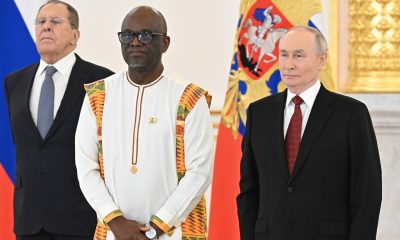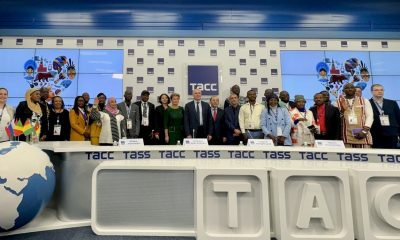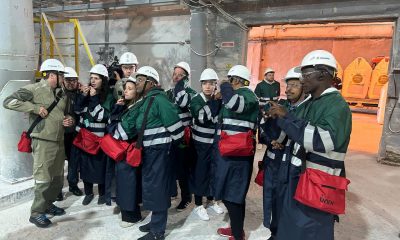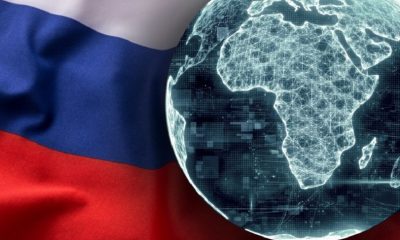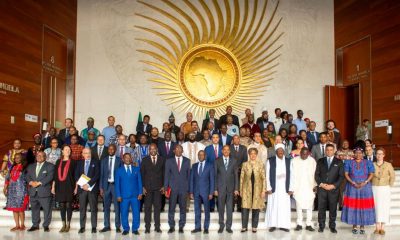World
Russia Shaping its Future Partnership with Africa
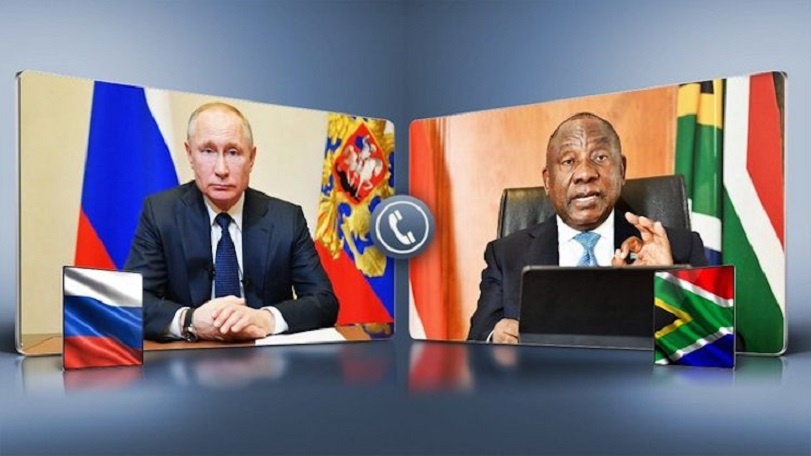
By Kestér Kenn Klomegâh
The second Russia-Africa summit is planned to demonstrate Russia’s stance against Western hegemony and its capitalist domination across Africa, to show Russia’s “non-Western friends” and to further solicit enormous support for its war in Ukraine. On Africa’s side, leaders plan for their traditional deliberations on “no-cost delivery” of grains while the chosen special group of mediators continues to broker expected peace between Russia and Ukraine.
The St. Petersburg gathering is designed to determine the trajectory of Russia’s relations with African countries in the long term. The program includes more than 30-panel sessions and thematic events on the most important issues of interaction between Russia and African countries.
President Vladimir Putin and his South African counterpart Cyril Ramaphosa discussed during their phone conversation in mid-July about the African peace initiative on Ukraine. The African leaders on a Ukraine peace mission will again have an opportunity to talk with Russian President Vladimir Putin on the sidelines of the upcoming Russia-Africa summit in St. Petersburg, Kremlin Spokesman Dmitry Peskov told TASS News Agency.
Diplomatic sources earlier that the African leaders of the Ukraine peace mission from Egypt, Zambia, Comoros, Congo, Senegal, Uganda and South Africa expected to meet with the head of the Russian state before the opening of the Russia-Africa summit in St. Petersburg or during its work.
“The summit’s program is still being prepared. But there will surely be an opportunity to talk on the sidelines,” Peskov said, responding to a question about whether such a meeting was possible in St. Petersburg. As one of the sources told the news agency, the seven African leaders agreed to continue efforts and discuss proposals under the Ukraine peace mission.
A delegation of seven African countries that included the presidents of Zambia, Comoros, Senegal and South Africa, the Egyptian prime minister and representatives of the Republic of Congo and Uganda visited Kyiv on June 16, where it held talks with Ukrainian President Vladimir Zelensky.
Russian Foreign Minister Sergey Lavrov said in an interview with Lenta.ru daily that “the Russian Foreign Ministry is working on opening new embassies in a number of African countries.”
“Following the 1st Russia-Africa Summit in Sochi in 2019, the national leadership adopted decisions on expanding our diplomatic presence in Africa,” Lavrov said. “The Foreign Ministry is working to open new embassies in a number of African countries.”
On 12 July, Addis Ababa hosted a pre-summit roundtable; discussions focused on the prospects for the development of Russia-Africa economic and social partnership relations. “The Russia-Africa summit is an event that plays a key role in the development of relations between Russia and Africa. It is to achieve a whole new level of mutually beneficial partnership capable of meeting the challenges of the 21st century in the shortest possible time,” emphasized Evgeny Terekhin, Ambassador Extraordinary and Plenipotentiary of Russia to Ethiopia.
The digitalization of Africa is attracting particular attention from Russians. We live in a digital world and undoubtedly, the future of civilization lies in the digital economy. For 20 years, digital transformation has been underway in all regions of Russia. Russia has the world’s best digital platforms for B2B, B2C, product labelling and educational services, and Moscow has become the best city in the world in terms of living comfort and digitalization of services offered, according to Igor Morozov, Chairman of the Coordinating Committee for Economic Cooperation with African Countries (AfroCom).
Senator Igor Morozov explained further that “the other cities in the top three are Toronto and Singapore. We certainly have a lot to share with our African partners, especially since they are already prepared for a new experience. The African Continental Free Trade Zone has started operating, and many African countries, including Ethiopia, are creating science and technology parks and IT clusters.”
As always, summit participants are arriving with foreign currency in their pockets or on their credit cards to St. Petersburg. It is a normal situation travelling African leaders with US dollars on their credit cards. Similarly, Russian officials exchange local rubles for foreign currency, for instance travelling to Miami leisure beach, Havana, Cuba or to their popular destination Dubai in the United Arab Emirates. Yet, Russians are the first partisan critics of de-dollarisation.
Everything now relates to colonialism, wraps up with neo-colonial clothes. Discourse on colonialism and neo-colonialism have become fashionable. Unsurprisingly, African migrants’ gruesome death at sea is also attributed to Europeans’ neo-colonialism. And no doubt, the movement of highly-skilled labour from Africa in search of employment opportunities on the global markets. In this case, African leaders primarily must share the blame for their utter failure to smoothly address development questions and to create better conditions at home.
Russia, like Africa, has also witnessed a ‘brain-drain’ these several years; most of its skilled specialists and professionals relocated to the United States, Canada and Europe. Understandably, more than three decades after the Soviet collapse, Russia has few well-trained multipolar-oriented specialists and professionals to work seriously on its diverse policy goals across Africa.
The Russian International Affairs Council, a non-government organisation and policy think-tank, published an opinion article authored by Kirill Babaev – Director of the Institute of Far Eastern Studies of the Russian Academy of Sciences, Professor at the Financial University. He made an excellent analysis of the relations between Russia and Africa.
The article highlighted future perspectives and successes in building political dialogues during the previous years. On the other hand, he was exposed for serious consideration by authorities to some existing obstacles and weaknesses.
Brain drain is seriously affecting Russia. Today the situation has changed radically, according to his assessment. Kirill Babaev pointed out the challenges Russia faces, one of them is “an immense lack of personnel for successful work in Africa” – and further suggested a necessity for putting together a distinctive group of experienced professionals and specialists to work on practical, consistent and effective policy challenges as well as geopolitical tasks with African countries.
In sharp contrast, during pre-summit roundtable discussions held this month, Oleg Ozerov, Head of the Secretariat of the Russia-Africa Partnership Forum, argued that Russia takes an interest in highly skilled specialists from Africa, but has no intention of encouraging any kind of “brain drain” like the West does by attracting and employing them in the United States.
“In other words, it is another form of neocolonialism, or the exploitation of Africa that has been carried out throughout centuries through the slave trade and the pumping of resources, and now it has evolved into ‘brain drain,'” Oleg Ozerov added. “In other words, those people who should boost Africa, transforming it into a new pole of growth. We are convinced that Africa has a vast future and potential, first and foremost, huge human potential in the continent.”
Reports from the World Bank indicated that the United States has the largest African diaspora, which has close-knitted business, educational and cultural links with African countries. This helps to support official efforts in promoting relations with Africa.
The US-Africa trade and commercial relations and engagement through the African Growth and Opportunity Act (AGOA) yields $78.01 billion per year, while, for instance, monetary remittances inflows to sub-Saharan Africa soared 14.1 per cent to $49 billion in 2021. Is that compared to Russia and China?
Beyond remittances, Africa benefits from the input of its diaspora considered very progressive. Ultimately, African leaders consistently engage with their diaspora, those excelling in sports, academia, business, science, technology, engineering and all those other significant sectors that the continent needs to optimise its potential and meet development priorities.
During the second week of July, St. Petersburg hosted Reversed Safari exhibit of contemporary African art, featuring works by 47 African and 14 Russian artists opened to the general public. There were over 300 pieces of art on display, including paintings, sculptures, photographs, and video footage, as well as three large-scale installations created specifically for the event. All exhibit items are devoted to the legacy of the colonial era, how different cultures interact, daily life and the search for identity.
According to Professor Gerrit Olivier, an emeritus professor at Pretoria University and former South African Ambassador to the Russian Federation and Kazakhstan, within the context of the current global changes of the 21st century, Russia is experiencing isolation, but African leaders would visit Moscow to meet Vladimir Putin. Today, Russia’s influence in Africa, despite efforts towards resuscitation, remains marginal. While, given its global status, Russia ought to be active with concrete development projects in Africa as Western Europe, the European Union, America, and China are, it is all but absent, playing a negligible role in Africa.
“These African leaders will realise that there will be no quid pro quo in Moscow, that a weakened Putin can offer nothing and his purpose with this meeting will mainly be to demonstrate support from Africa. This will probably be forthcoming in the form of a repeated ‘non-aligned’ posture (the African warped interpretation, that is), and those leaders presently under the protection of Wagner would no doubt insist on continuation. All this, no doubt, will be used as a propaganda piece against the West!”
Professor David Shinn, a former top U.S. diplomat and now an Adjunct Professor of International Affairs at George Washington University’s Elliot School of International Affairs, discusses a few significant points here relating to the forthcoming summit.
This is an interesting time for Russia to host the Africa summit. The emerging multipolar world, especially Russia’s partnership with China, briefly put Vladimir Putin in a stronger position in Africa vis-à-vis the West. Most African leaders seem to favour the multipolar order. Putin’s invasion of Ukraine significantly disrupted that positive trend for Russia. Just over half of Africa’s governments oppose or are skeptical of Moscow’s engagement in Ukraine while just under half were willing to express a neutral position and Eritrea to express support.
“The mutiny by the Wagner Group has further complicated Russia’s position in Africa and raises serious questions about the strength of its partnership with China. While a small number of autocratic African leaders beholden to the Wagner Group (and Eritrea) remain for the time being firm with Russia, I suspect the mutiny has raised second thoughts with other African leaders who were neutral and strengthened the concerns of those leaders who opposed or were sceptical of the invasion from the beginning,” Professor Shinn wrote further in his email.
According to the academic professor, Vladimir Putin would want to go forward with the Africa summit this month to “prove” to the world that the situation in Russia is back to normal. “But I wonder how enthusiastic most African leaders will be to participate at this time when the future of the Wagner Group in Africa is in doubt, Russia is doing poorly in Ukraine, and Moscow is less able to offer Africa much of tangible value. African attendance at the summit and the substance of the results will be most telling,” Professor Shinn concluded.
Dr Alex Vines, Africa Program Director at Chatham House, a policy think tank, told this author that “the Lavrov visits to Africa this year and Russian diplomacy has been focused at getting African leadership to attend the St Petersburg summit. The number of leaders attending is important for Moscow to show it’s not isolated and Africans still wish to engage with Russia diplomatically.”
Notwithstanding those several initiatives of engaging in the economic sectors and supporting Africa, Russia has its strengths and weaknesses based on history, but the balance is positive in this new world. Whatever African leaders wanted depended on their rational and calculated basis and on their ability to build up multifaceted development-oriented relations with Russia.
At the end of the summit, there would a joint declaration, pre-summit media reports indicated. Several other documents and agreements including those on cooperation in space, anti-terrorist activity and security, as well as economic and humanitarian cooperation. The second Russia-Africa summit and the Economic and Humanitarian Forum will be held in St. Petersburg at the ExpoForum Convention and Exhibition Centre on 27–28 July 2023.
World
AfBD, AU Renew Call for Visa-Free Travel to Boost African Economic Growth

By Adedapo Adesanya
The African Development Bank (AfDB) and the African Union have renewed their push for visa-free travel to accelerate Africa’s economic transformation.
The call was reinforced at a High-Level Symposium on Advancing a Visa-Free Africa for Economic Prosperity, where African policymakers, business leaders, and development institutions examined the need for visa-free travel across the continent.
The consensus described the free movement of people as essential to unlocking Africa’s economic transformation under the African Continental Free Trade Area (AfCFTA).
The symposium was co-convened by AfDB and the African Union Commission on the margins of the 39th African Union Summit of Heads of State and Government in Addis Ababa.
The participants framed mobility as the missing link in Africa’s integration agenda, arguing that while tariffs are falling under AfCFTA, restrictive visa regimes continue to limit trade in services, investment flows, tourism, and labour mobility.
On his part, Mr Alex Mubiru, Director General for Eastern Africa at the African Development Bank Group, said that visa-free travel, interoperable digital systems, and integrated markets are practical enablers of enterprise, innovation, and regional value chains to translate policy ambitions into economic activity.
“The evidence is clear. The economics support openness. The human story demands it,” he told participants, urging countries to move from incremental reforms to “transformative change.”
Ms Amma A. Twum-Amoah, Commissioner for Health, Humanitarian Affairs and Social Development at the African Union Commission, called for faster implementation of existing continental frameworks.
She described visa openness as a strategic lever for deepening regional markets and enhancing collective responses to economic and humanitarian crises.
Former AU Commission Chairperson, Ms Nkosazana Dlamini-Zuma, reiterated that free movement is central to the African Union’s long-term development blueprint, Agenda 2063.
“If we accept that we are Africans, then we must be able to move freely across our continent,” she said, urging member states to operationalise initiatives such as the African Passport and the Free Movement of Persons Protocol.
Ghana’s Trade and Industry Minister, Mrs Elizabeth Ofosu-Adjare, shared her country’s experience as an early adopter of open visa policies for African travellers, citing increased business travel, tourism, and investor interest as early dividends of greater openness.
The symposium also reviewed findings from the latest Africa Visa Openness Index, which shows that more than half of intra-African travel still requires visas before departure – seen by participants as a significant drag on intra-continental commerce.
Mr Mesfin Bekele, Chief Executive Officer of Ethiopian Airlines, called for full implementation of the Single African Air Transport Market (SAATM), saying aviation connectivity and visa liberalisation must advance together to enable seamless travel.
Regional representatives, including Mr Elias Magosi, Executive Secretary of the Southern Africa Development Community, emphasised the importance of building trust through border management and digital information-sharing systems.
Ms Gabby Otchere Darko, Executive Chairman of the Africa Prosperity Network, urged governments to support the “Make Africa Borderless Now” campaign, while tourism campaigner Ras Mubarak called for more ratifications of the AU Free Movement of Persons protocol.
Participants concluded that achieving a visa-free Africa will require aligning migration policies, digital identity systems, and border infrastructure, alongside sustained political commitment.
World
Nigeria Exploring Economic Potential in South America, Particularly Brazil

By Kestér Kenn Klomegâh
In this interview, Uche Uzoigwe, Secretary-General of NIDOA-Brazil, discusses the economic potential in South America, particularly Brazil, and investment incentives for Brazilian corporate partners for the Federal Republic of Nigeria (FRN). Follow the discussion here:
How would you assess the economic potential in the South American region, particularly Brazil, for the Federal Republic of Nigeria? What investment incentives does Nigeria have for potential corporate partners from Brazil?
As the Secretary of NIDOA Brazil, my response to the questions regarding the economic potentials in South America, particularly Brazil, and investment incentives for Brazilian corporate partners would be as follows:
Brazil, as the largest economy in South America, presents significant opportunities for the Federal Republic of Nigeria. The country’s diverse economy is characterised by key sectors such as agriculture, mining, energy, and technology. Here are some factors to consider:
- Natural Resources: Brazil is rich in natural resources like iron ore, soybeans, and biofuels, which can be beneficial to Nigeria in terms of trade and resource exchange.
- Growing Agricultural Sector: With a well-established agricultural sector, Brazil offers potential collaboration in agri-tech and food security initiatives, which align with Nigeria’s goals for agricultural development.
- Market Size: Brazil boasts a large consumer market with a growing middle class. This represents opportunities for Nigerian businesses looking to export goods and services to new markets.
- Investment in Infrastructure: Brazil has made significant investments in infrastructure, which could create opportunities for Nigerian firms in construction, engineering, and technology sectors.
- Cultural and Economic Ties: There are historical and cultural ties between Nigeria and Brazil, especially considering the African diaspora in Brazil. This can facilitate easier business partnerships and collaborations.
In terms of investment incentives for potential corporate partners from Brazil, Nigeria offers several attractive incentives for Brazilian corporate partners, including:
- Tax Incentives: Various tax holidays and concessions are available under the Nigerian government’s investment promotion laws, particularly in key sectors like agriculture, manufacturing, and technology.
- Repatriation of Profits: Brazil-based companies investing in Nigeria can repatriate profits without restrictions, thus enhancing their financial viability.
- Access to the African Market: Investment in Nigeria allows Brazilian companies to access the broader African market, benefiting from Nigeria’s membership in regional trade agreements such as ECOWAS.
- Free Trade Zones: Nigeria has established free trade zones that offer companies the chance to operate with reduced tariffs and fewer regulatory burdens.
- Support for Innovation: The Nigerian government encourages innovation and technology transfer, making it attractive for Brazilian firms in the tech sector to collaborate, particularly in fintech and agriculture technology.
- Collaborative Ventures: Opportunities exist for joint ventures with local firms, leveraging local knowledge and networks to navigate the business landscape effectively.
In conclusion, fostering a collaborative relationship between Nigeria and Brazil can unlock numerous economic opportunities, leading to mutual growth and development in various sectors. We welcome potential Brazilian investors to explore these opportunities and contribute to our shared economic goals.
In terms of this economic cooperation and trade, what would you say are the current practical achievements, with supporting strategies and systemic engagement from NIDOA?
As the Secretary of NIDOA Brazil, I would highlight the current practical achievements in economic cooperation and trade between Nigeria and Brazil, alongside the supporting strategies and systemic engagement from NIDOA.
Here are some key points:
Current Practical Achievements
- Increased Bilateral Trade: There has been a notable increase in bilateral trade volume between Nigeria and Brazil, particularly in sectors such as agriculture, textiles, and technology. Recent trade agreements and discussions have facilitated smoother trade relations.
- Joint Ventures and Partnerships: Successful joint ventures have been established between Brazilian and Nigerian companies, particularly in agriculture (e.g., collaboration in soybean production and agricultural technology) and energy (renewables, oil, and gas), demonstrating commitment to mutual development.
- Investment in Infrastructure Development: Brazilian construction firms have been involved in key infrastructure projects in Nigeria, contributing to building roads, bridges, and facilities that enhance connectivity and economic activity.
- Cultural and Educational Exchange Programs: Programs facilitating educational exchange and cultural cooperation have led to strengthened ties. Brazilian universities have partnered with Nigerian institutions to promote knowledge transfer in various fields, including science, technology, and arts.
Supporting Strategies
- Strategic Trade Dialogue: NIDOA has initiated regular dialogues between trade ministries of both nations to discuss trade barriers, potential markets, and cooperative opportunities, ensuring both countries are aligned in their economic goals.
- Investment Promotion Initiatives: Targeted initiatives have been established to promote Brazil as an investment destination for Nigerian businesses and vice versa. This includes showcasing success stories at international trade fairs and business forums.
- Capacity Building and Technical Assistance: NIDOA has offered capacity-building programs focused on enhancing Nigeria’s capabilities in agriculture and technology, leveraging Brazil’s expertise and sustainable practices.
- Policy Advocacy: Continuous advocacy for favourable trade policies has been a key focus for NIDOA, working to reduce tariffs and promote economic reforms that facilitate investment and trade flows.
Systemic Engagement
- Public-Private Partnerships (PPPs): Engaging the private sector through PPPs has been essential in mobilising resources for development projects. NIDOA has actively facilitated partnerships that leverage both public and private investments.
- Trade Missions and Business Delegations: Organised trade missions to Brazil for Nigerian businesses and vice versa, allowing for direct engagement with potential partners, fostering trust and opening new channels for trade.
- Monitoring and Evaluation: NIDOA implements a rigorous monitoring and evaluation framework to assess the impact of various initiatives and make necessary adjustments to strategies, ensuring effectiveness in achieving economic cooperation goals.
Through these practical achievements, supporting strategies, and systemic engagement, NIDOA continues to play a pivotal role in enhancing economic cooperation and trade between Nigeria and Brazil. By fostering collaboration and leveraging shared resources, we aim to create a sustainable and mutually beneficial economic environment that promotes growth for both nations.
Do you think the changing geopolitical situation poses a number of challenges to connecting businesses in the region with Nigeria, and how do you overcome them in the activities of NIDOA?
The changing geopolitical situation indeed poses several challenges for connecting businesses in the South American region, particularly Brazil, with Nigeria. These challenges include trade tensions, shifting alliances, currency fluctuations, and varying regulatory environments. Below, I will outline some of the specific challenges and how NIDOA works to overcome them:
Current Challenges
- No Direct Flights: This challenge is obviously explicit. Once direct flights between Brazil and Nigeria become active, and hopefully this year, a much better understanding and engagement will follow suit.
- Trade Restrictions and Tariffs: Increasing trade protectionism in various regions can lead to higher tariffs and trade barriers that hinder the movement of goods between Brazil and Nigeria.
- Currency Volatility: Fluctuations in the value of currencies can complicate trade agreements, pricing strategies, and overall financial planning for businesses operating in both Brazil and Nigeria.
- Different regulatory frameworks and compliance requirements in both countries can create challenges for businesses aiming to navigate these systems efficiently.
- Supply Chain Disruptions: Changes in global supply chains due to geopolitical factors may disrupt established networks, impacting businesses relying on imports and exports between the two nations.
Overcoming Challenges through NIDOA.
NIDOA actively engages in discussions with both the Brazilian and Nigerian governments to advocate for favourable trade policies and agreements that reduce tariffs and improve trade conditions. This year in October, NIDOA BRAZIL holds its TRADE FAIR in São Paulo, Brazil.
What are the popular sentiments among the Nigerians in the South American diaspora? As the Secretary-General of the NIDOA, what are your suggestions relating to assimilation and integration, and of course, future perspectives for the Nigerian diaspora?
As the Secretary-General of NIDOA, I recognise the importance of understanding the sentiments among Nigerians in the South American diaspora, particularly in Brazil.
Many Nigerians in the diaspora take pride in their cultural roots, celebrating their heritage through festivals, music, dance, and culinary traditions. This cultural expression fosters a sense of community and belonging.
While many individuals embrace their new environments, they often face challenges related to cultural differences, language barriers, and social integration, which can lead to feelings of isolation.
Many express optimism about opportunities in education, business, and cultural exchange, viewing their presence in South America as a chance to expand their horizons and contribute to economic activities both locally and back in Nigeria.
Sentiments regarding acceptance vary; while some Nigerians experience warmth and hospitality, others encounter prejudice or discrimination, which can impact their overall experience in the host country. NIDOA BRAZIL has encouraged the formation of community organisations that promote networking, cultural exchange, and social events to foster a sense of belonging and support among Nigerians in the diaspora. There are currently two forums with over a thousand Nigerian members.
Cultural Education and Awareness Programs: NIDOA BRAZIL organises cultural education programs that showcase Nigerian heritage to local communities, promoting mutual understanding and appreciation that can facilitate smoother integration.
Language and Skills Training: NIDOA BRAZIL provides language courses and skills training programs to help Nigerians, especially students in tertiary institutions, adapt to their new environment, enhancing communication and employability within the host country.
Engaging in Entrepreneurship: NIDOA BRAZIL supports the entrepreneurial spirit among Nigerians in the diaspora by facilitating access to resources, mentorship, and networks that can help them start businesses and create economic opportunities.
Through its AMBASSADOR’S CUP COMPETITION, NIDOA Brazil has engaged students of tertiary institutions in Brazil to promote business projects and initiatives that can be implemented in Nigeria.
NIDOA BRAZIL also pushes for increased tourism to Brazil since Brazil is set to become a global tourism leader in 2026, with a projected 10 million international visitors, driven by a post-pandemic rebound, enhanced air connectivity, and targeted marketing strategies.
Brazil’s tourism sector is poised for a remarkable milestone in 2026, as the country expects to welcome over 10 million international visitors—surpassing the previous record of 9.3 million in 2025. This expected surge represents an ambitious leap, nearly doubling the country’s foreign-arrival numbers within just four years, a feat driven by a combination of pent-up global demand, strategic air connectivity improvements, and a highly targeted marketing campaign.
World
African Visual Art is Distinguished by Colour Expression, Dynamic Form—Kalalb

By Kestér Kenn Klomegâh
In this insightful interview, Natali Kalalb, founder of NAtali KAlalb Art Gallery, discusses her practical experiences of handling Africa’s contemporary arts, her professional journey into the creative industry and entrepreneurship, and also strategies of building cultural partnership as a foundation for Russian-African bilateral relations. Here are the interview excerpts:
Given your experience working with Africa, particularly in promoting contemporary art, how would you assess its impact on Russian-African relations?
Interestingly, my professional journey in Africa began with the work “Afroprima.” It depicted a dark-skinned ballerina, combining African dance and the Russian academic ballet tradition. This painting became a symbol of cultural synthesis—not opposition, but dialogue.
Contemporary African art is rapidly strengthening its place in the world. By 2017, the market was growing so rapidly that Sotheby launched its first separate African auction, bringing together 100 lots from 60 artists from 14 foreign countries, including Algeria, Ghana, Mali, Nigeria, Senegal, and others. That same year during the Autumn season, Louis Vuitton Foundation in Paris hosted a major exhibition dedicated to African art. According to Artnet, sales of contemporary African artists reached $40 million by 2021, a 434% increase in just two years. Today, Sotheby holds African auctions twice a year, and in October 2023, they raised $2.8 million.
In Russia, this process manifests itself through cultural dialogue: exhibitions, studios, and educational initiatives create a space of trust and mutual respect, shaping the understanding of contemporary African art at the local level.
Do you think geopolitical changes are affecting your professional work? What prompted you to create an African art studio?
The international context certainly influences cultural processes. However, my decision to work with African themes was not situational. I was drawn to the expressiveness of African visual language—colour, rhythm, and plastic energy. This theme is practically not represented systematically and professionally in the Russian art scene.
The creation of the studio was a step toward establishing a sustainable platform for cultural exchange and artistic dialogue, where the works of African artists are perceived as a full-fledged part of the global cultural process, rather than an exotic one.
To what extent does African art influence Russian perceptions?
Contemporary African art is gradually changing the perception of the continent. While previously viewed superficially or stereotypically, today viewers are confronted with the depth of artistic expression and the intellectual and aesthetic level of contemporary artists.
Portraits are particularly impactful: they allow us to see not just an abstract image of a “continent,” but a concrete personality, character, and inner dignity. Global market growth data and regular auctions create additional trust in African contemporary art and contribute to its perception as a mature and valuable movement.
Does African art reflect lifestyle and fashion? How does it differ from Russian art?
African art, in my opinion, is at its peak in everyday culture—textiles, ornamentation, bodily movement, rhythm. It interacts organically with fashion, music, interior design, and the urban environment. The Russian artistic tradition is historically more academic and philosophical. African visual art is distinguished by greater colour expression and dynamic form. Nevertheless, both cultures are united by a profound symbolic and spiritual component.
What feedback do you receive on social media?
Audience reactions are generally constructive and engaging. Viewers ask questions about cultural codes, symbolism, and the choice of subjects. The digital environment allows for a diversity of opinions, but a conscious interest and a willingness to engage in cultural dialogue are emerging.
What are the key challenges and achievements of recent years?
Key challenges:
- Limited expert base on African contemporary art in Russia;
- Need for systematic educational outreach;
- Overcoming the perception of African art as exclusively decorative or ethnic.
Key achievements:
- Building a sustainable audience;
- Implementing exhibition and studio projects;
- Strengthening professional cultural interaction and trust in African
contemporary art as a serious artistic movement.
What are your future prospects in the context of cultural diplomacy?
Looking forward, I see the development of joint exhibitions, educational programs, and creative residencies. Cultural diplomacy is a long-term process based on respect and professionalism. If an artistic image is capable of uniting different cultural traditions in a single visual space, it becomes a tool for mutual understanding.
-

 Feature/OPED6 years ago
Feature/OPED6 years agoDavos was Different this year
-
Travel/Tourism10 years ago
Lagos Seals Western Lodge Hotel In Ikorodu
-

 Showbiz3 years ago
Showbiz3 years agoEstranged Lover Releases Videos of Empress Njamah Bathing
-

 Banking8 years ago
Banking8 years agoSort Codes of GTBank Branches in Nigeria
-

 Economy3 years ago
Economy3 years agoSubsidy Removal: CNG at N130 Per Litre Cheaper Than Petrol—IPMAN
-

 Banking3 years ago
Banking3 years agoSort Codes of UBA Branches in Nigeria
-

 Banking3 years ago
Banking3 years agoFirst Bank Announces Planned Downtime
-

 Sports3 years ago
Sports3 years agoHighest Paid Nigerian Footballer – How Much Do Nigerian Footballers Earn


